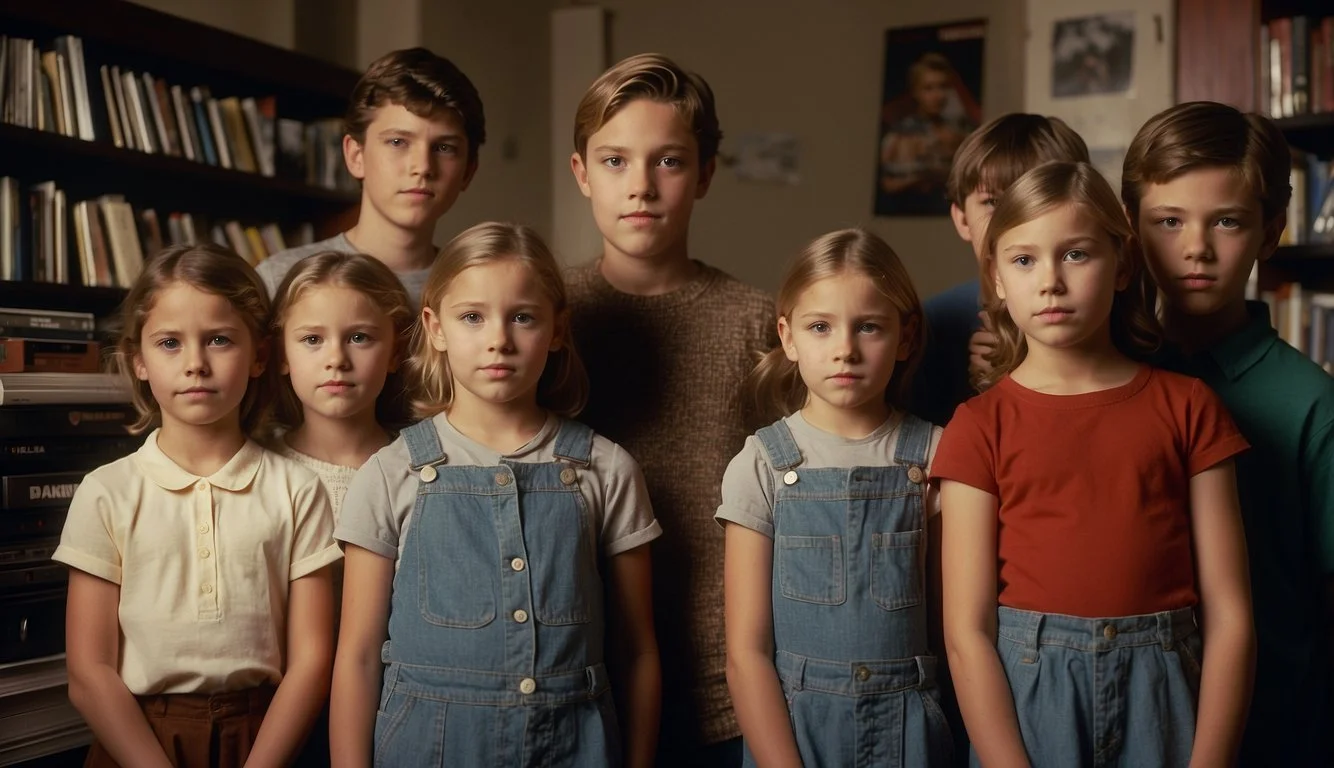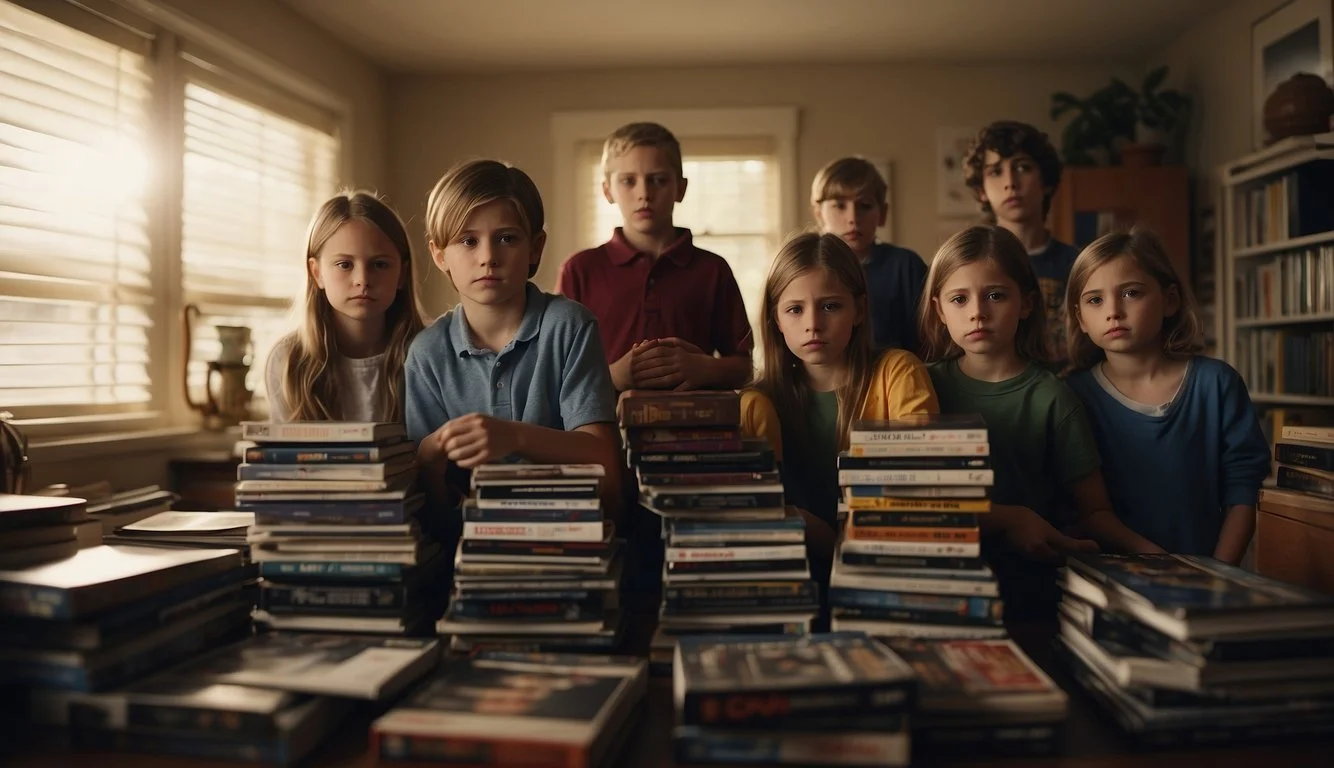Documentary Review: The Wolfpack (2015)
An Insider Look at Isolation and Media Influence
"The Wolfpack" (2015) stands out as a striking documentary that explores the lives of six siblings confined to their Manhattan apartment for 17 years. Directed by Crystal Moselle, this film delves into the unique world of the Angulo brothers, whose only connection to the outside world was through the movies they meticulously recreated.
The documentary captures the creativity and resilience of these siblings, highlighting their remarkable ability to construct a vivid inner world despite their isolation. Moselle's chance encounter with the Angulo brothers on a New York City street set the stage for an intimate portrayal of their lives.
Throughout "The Wolfpack," viewers are invited to witness a narrative that intertwines confinement and imagination, shedding light on how a restrictive environment can foster unexpected talents. This compelling story offers a fresh perspective on family dynamics and the power of cinema.
Background Information
The Wolfpack is a documentary directed by Crystal Moselle. It premiered at the Sundance Film Festival in 2015 and quickly became one of the standout films of the event.
Moselle discovered the film's subjects purely by chance. One day, she encountered six young men dressed in suits and sunglasses walking down a New York City street. This unusual sight led her to meet the Angulo brothers.
The Angulo brothers, Bhagavan, Govinda, and their siblings, were raised in near-total isolation in an apartment in downtown New York City. Their father kept the family almost entirely indoors, fearing the external world. They learned about society primarily from watching movies.
The brothers often recreated scenes from their favorite films, using elaborate costumes and props they made themselves. This element of their lives is prominently featured in the documentary.
Despite their confined upbringing, the brothers' creativity and resourcefulness are deeply engaging. Their story raises important questions about freedom, control, and the power of cinema.
The documentary stands out for its intimate and raw portrayal of the brothers' lives. Moselle's approach omits typical documentary techniques like outside testimonials, focusing instead on the brothers' perspectives.
Genres:
Documentary
Family
Sociology
Key Figures:
Director: Crystal Moselle
Subjects: Bhagavan, Govinda, and the Angulo brothers
The film also explores the dynamics within the Angulo family, providing a unique glimpse into an extraordinary upbringing. The brothers eventually venture into the outside world, challenging their previously constrained existence.
This documentary has received critical acclaim for its powerful storytelling and unique subject matter, making it a noteworthy entry in the genre.
Synopsis of 'The Wolfpack'
'The Wolfpack' is a compelling documentary directed by Crystal Moselle. It follows the lives of the Angulo brothers, six siblings who grew up in isolation in a Manhattan apartment.
These brothers spent their formative years rarely leaving their home. Their father, fearing the outside world, enforced strict confinement.
Despite this isolation, the Angulo brothers developed a deep connection with movies. They watched and meticulously recreated their favorite films, using them as a means of understanding the world.
The documentary captures their home life, filled with numerous handmade costumes and props. It also showcases their eventual steps into society, documenting their experiences as they venture outside.
Moselle's film is a poignant exploration of resilience and creativity, set against the backdrop of an unconventional upbringing.
Critical Analysis
"The Wolfpack" (2015) offers a compelling look at the Angulo brothers, who grew up isolated in a New York City apartment. This documentary, directed by Crystal Moselle, skillfully captures their unique story through insightful direction, thoughtful cinematography, precise editing, and an evocative music score.
Direction and Production
Crystal Moselle's direction stands out for its instinctive approach. She discovered the Angulo brothers by chance on an NYC street, which is a testament to her keen observational skills. Her choice to focus on the brothers' secluded upbringing and their escape through cinema creates a rich, engaging narrative. Moselle's production style is intimate and immersive, drawing viewers into the daily lives of the brothers. She balances sensitivity with curiosity, making sure their voices drive the story.
Cinematography
The cinematography by Moselle is characterized by its raw and unpolished aesthetic. Handheld camera techniques add a sense of immediacy and authenticity, which is pivotal for a documentary of this nature. Close-up shots emphasize the emotional nuances of the brothers' interactions and their confined living space. The visual representation of their apartment versus the outside world underscores their isolation and the stark contrast they face when stepping into society for the first time.
Editing
The editing of "The Wolfpack," handled by Enat Sidi, is meticulous and deliberate. It weaves together interviews, home videos, and footage of the brothers reenacting scenes from their favorite movies. This patchwork of media offers a multifaceted view of their lives. The editor's choice to juxtapose their past with their present actions demonstrates the evolution of their self-awareness and creativity. Each cut builds on the narrative, seamlessly transitioning from one moment to another while maintaining the film's emotional rhythm and pacing.
Music and Sound Design
Music and sound design play critical roles in enhancing the storytelling. The score, composed by Alec Puro, complements the film’s mood, emphasizing both the whimsical and poignant moments. Subtle background sounds, such as the hum of the apartment and outdoor noises when the brothers venture out, further immerse the audience in their world. The careful selection of diegetic and non-diegetic sound elements helps to bridge the gap between the brothers' imagined cinematic world and their reality.
Themes and Motifs
"The Wolfpack" delves into rich and complex themes, drawing viewers into a world shaped by the unique experiences of the Angulo brothers. The film explores isolation, the blurred line between reality and fiction, intricate family dynamics, and the quest for freedom amidst control.
Isolation and Connectivity
The Angulo brothers experience extreme isolation, having been confined to their Manhattan apartment for the majority of their lives. Their primary connection to the outside world comes through movies, which they watch obsessively. By recreating scenes from their favorite films, they establish a form of connectivity with the external world and with each other. The documentary highlights both the psychological impact of isolation and the human need for interaction, raising questions about the effects of such extreme seclusion on personal development and social skills.
Reality vs. Fiction
The brothers' extensive exposure to films blurs the lines between reality and fiction. They often reenact scenes from movies with remarkable detail, using elaborate homemade costumes and props. This immersion into fictional worlds becomes a coping mechanism and a means of self-expression. The film portrays how their understanding of real-life events and emotions is profoundly influenced by cinematic narratives, challenging the audience's perceptions of what is real versus imagined. It offers a poignant exploration of the transformative power of storytelling and the role movies play in shaping identity.
Family Dynamics
The relationship among the Angulo family members is complex. The film depicts a father who exercises strict control, dictating the terms of their confinement and education. The mother, while more nurturing, is also complicit in this controlled environment. Despite these constraints, the brothers exhibit solidarity and deep bonds, supporting each other through their shared experiences. The documentary reveals how family dynamics can be altered by unconventional living situations and how resilience and unity can emerge even under restrictive circumstances.
Freedom and Control
A constant tension between freedom and control runs throughout the film. The father imposes severe restrictions, believing he is protecting his children from the dangers of the outside world. Meanwhile, the brothers yearn for independence and new experiences. Their eventual forays into New York City signify small but meaningful steps toward freedom. The film highlights their gradual assertion of autonomy and the challenges they face in breaking free from the constraints imposed on them. This battle between control and the desire for liberty is central to their journey and growth.
By navigating these themes, "The Wolfpack" provides a window into the extraordinary lives of the Angulo brothers, making viewers reflect on broader societal questions about isolation, family, and the quest for freedom.
Cast and Performances
“The Wolfpack” is unique in its approach to documentary filmmaking, featuring real-life individuals rather than traditional actors. The film focuses on the Angulo brothers: Mukunda, Narayana, Bhagavan, Govinda, Jagadisa, and Krisna.
Each brother brings a distinct personality to the screen. Mukunda, often seen as the leader, delivers a particularly compelling presence. His interactions show a deep sense of introspection.
The Angulo brothers’ performances are authentic and unfiltered. They express their creativity through detailed reenactments of popular films. This includes intricate costumes and set designs made from household items, demonstrating their resourcefulness.
Susanne Angulo, their mother, also appears infrequently but plays a critical role. Her quiet strength adds depth to the narrative, shedding light on the family dynamics within their confined environment.
Director Crystal Moselle deserves recognition for her ability to capture the brothers’ unique qualities. Her observational style allows their natural charisma and resilience to shine through without intrusive manipulation.
Enat Sidi, the film’s editor, plays a significant role in shaping the performances. Her editing ensures that the narrative flows smoothly, making each interaction between the brothers feel impactful and significant.
This thoughtful combination of real people, genuine emotions, and skillful editing makes “The Wolfpack” a standout documentary. The Angulo brothers' raw talent in front of the camera and behind-the-scenes creativity leave a lasting impression.
Reception
The Wolfpack received significant attention following its debut at the 2015 Sundance Film Festival. It garnered praise for its unique and compelling storyline, capturing the lives of six brothers isolated from society in a New York City apartment.
Critics highlighted director Crystal Moselle’s ability to tell a gripping story with minimal intrusion. Roger Ebert described the film as a product of "blind luck," due to Moselle’s serendipitous encounter with the brothers.
Variety noted that while the documentary covered a fascinating subject, its execution elicited mixed reactions. The variety of critical opinions shows that though some found the film transcendent, others saw areas for improvement.
On the other hand, Manohla Dargis from The Times pointed out that the documentary omitted certain information, which could have provided a more comprehensive view of the brothers' experiences.
The film's artistic quality was praised by Vulture as a rare and transcendent work of art.
Key Points
Location of Premiere: Sundance Film Festival, 2015
Critical Highlights:
Unique subject matter
Award-winning cinematography
Mixed reactions on execution
The documentary managed to leave a lasting impression on both audiences and critics alike, due to its insightful portrayal and unexpected discovery.
Cultural Impact
The Wolfpack's cultural impact lies in its unique subject matter and the way it highlights the intersection of isolation and media consumption. The documentary introduces viewers to the Angulo brothers, who spent most of their lives confined to their New York City apartment.
Raised in near-total isolation, the brothers relied heavily on movies to understand the outside world. They meticulously recreated their favorite films, demonstrating the powerful influence of cinema on their lives. This brings to light the idea of media as a formative force, shaping identity and perspective.
The film invokes discussions on media consumption and its effects on individuals, particularly those in isolated circumstances. It poses questions about how media can both liberate and confine, acting as a window to the world yet forming a lens through which reality is perceived.
Moreover, it brings attention to unusual familial dynamics and the extreme measures some families may take to protect or control their members. The Angulo family’s story has sparked dialogue about home education, parental control, and the right to freedom and socialization.
Critics note that the documentary's portrayal of the brothers reflects broader societal themes of individual identity and collective resilience. The Angulo brothers' ability to find connection and hope through their shared passion for films offers a powerful commentary on human adaptability and creativity.
Additionally, the documentary has inspired conversations on the accessibility of independent filmmaking. Director Crystal Moselle's discovery of the brothers serendipitously underscores how unexpected stories can become influential narratives, given the right platform and exposure.
Personal Reflections
Watching The Wolfpack evokes a mix of emotions. The documentary tells the story of the Angulo brothers who grew up isolated from the world in their New York City apartment. Their primary connection to the outside world was through movies. This unique upbringing is both fascinating and troubling.
The film captures the brothers re-enacting their favorite movie scenes. Their creativity and resourcefulness stand out. They craft props and costumes from everyday materials, showing their deep immersion in film culture. It's their way of experiencing the world beyond their apartment walls.
There is a palpable sense of wonder as the brothers step outside more frequently. Their reactions to New York City are both heartwarming and sobering. They confront the vastness of the world they were deprived of for so long.
The relationship between the brothers is compelling. Their bond is incredibly strong, forged in the crucible of their unique circumstances. Despite their isolation, they develop a rich, shared world through films. This connection is a testament to the resilience of the human spirit.
There is an underlying tension as the viewer contemplates the parents' role in this isolation. While the father’s strict rules are unsettling, the mother's compliance adds complexity. This aspect sparks further contemplation about control, freedom, and upbringing.
The Wolfpack is a testament to the power of storytelling. The brothers' journey from confinement to exploration resonates deeply. It's a reminder of how film can impact lives, providing both escape and inspiration.
Conclusion
The Wolfpack by Crystal Moselle provides a compelling glance into the secluded life of the Angulo brothers.
The documentary effectively utilizes interviews and home video footage to illustrate their unique upbringing, confined in a Manhattan apartment for 17 years.
Viewers are led through their journey of discovery and self-expression, primarily through the lens of cinema, which became their gateway to the outside world.
Moselle's narrative approach is notably intimate. She captures the brothers' adaptation to life beyond their apartment, reflecting broader themes of freedom and identity.
A few critics note missing external perspectives, potentially limiting its depth. Nevertheless, The Wolfpack remains a striking exploration of human resilience and the power of imagination.




